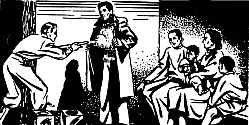|
In 1939
Swiss farmers were bothered with an unusual number of
insects and since there was a great shortage of the usual insecticides
the Geigy Chemical Company of Switzerland began to look around for
substitutes. One of their young chemists, Paul Mueller, resurrected
Zeidler's old formula and tried out some of the D.D.T.
The results were amazing. It took only the slightest contact with the chemical to kill the insects. But the Swiss scientists found the usefulness of the new insecticide was not limited to just plant destroyers - it was equally effective against flies and lice. And when the War broke out and with it came the threat of typhus the Geigy Company's American branch in New York turned over to our Army samples of the new insecticide which they had received from the parent company in Switzerland.  In Orlando, Florida, government entomologists began to test the new material and all of the amazing claims were justified. A little D.D.T. powder dusted into the clothes safeguards the wearer from typhus - for two weeks - and if the clothes were washed in a solution of the chemical the period was extended to three months! |








